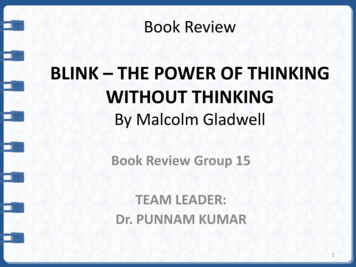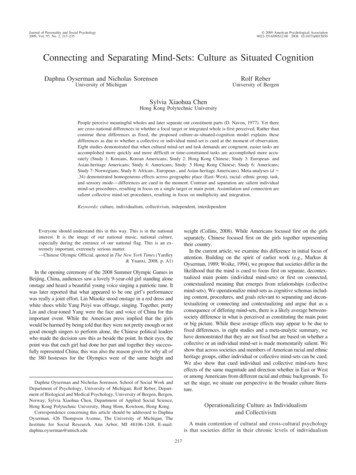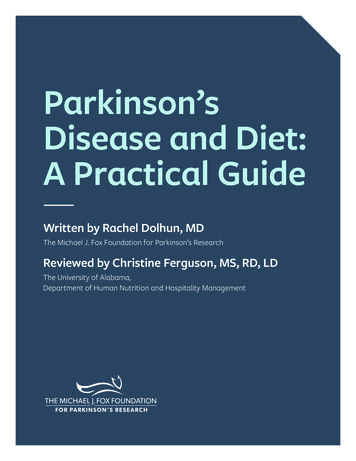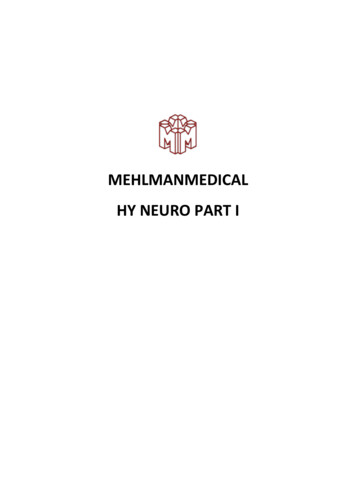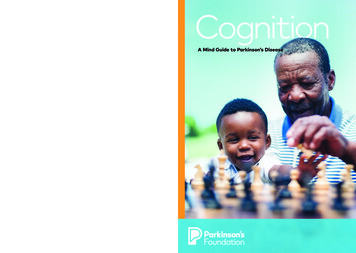
Transcription
A Mind Guide to Parkinson’s Disease200 SE 1st Street, Suite 800Miami, Florida 331311359 Broadway, Suite 1509New York, New York 10018helpline:800. 4PD.INFO (473.4636)helpline@parkinson.orgparkinson. org
About the Parkinson’s FoundationThe Parkinson’s Foundation makes life better for people with Parkinson’sdisease by improving care and advancing research toward a cure.In everything we do, we build on the energy, experience and passionof our global Parkinson’s community. A wealth of information aboutParkinson’s and about our activities and resources is available on ourwebsite, Parkinson.org.Your feedback matters!We’d like to know what you think of our publications and programs.Please take a few moments to fill out our online feedback form.Your answers will be used to improve our resources and will benefitpeople with Parkinson’s, caregivers, families and others in theParkinson’s community. Thank you for your help.Online form:About this bookGlossaryDefinitions for all words underlined in blue canbe found in the glossary starting on page 42.A comprehensive Parkinson’s disease glossarycan be found at Parkinson.org/glossary.IndexAn index of key words and topics can be foundon page 47.parkinson’s foundation resourcesCertain pages include tip sheets with practicalpointers for coping with cognitive changes.You can find more helpful tips for managingParkinson’s in the books, fact sheets, videos andpodcasts in our PD library at Parkinson.org/library.Parkinson.org/feedbackYour generosity makes this publication possible.The Parkinson’s Foundation is proud to provide this booklet and othereducational materials at no cost to people around the globe. If you foundthis book helpful, please consider a gift so that we may continue to fightParkinson’s on all fronts: funding innovative research, providing supportservices and offering educational materials such as this publication.Thank you for your support.Donate online:Parkinson.org/donateDonate by mail: Parkinson’s Foundation200 SE 1st St, Suite 800Miami, FL 33131Donate by phone:1-800-4PD-INFO (473-4636)Tax ID:13-1866796The information contained in this publication is provided for informational and educationalpurposes only and should not be construed to be a diagnosis, treatment, regimen or anyother healthcare advice or instruction. The reader should seek his or her own medical orother professional advice, which this publication is not intended to replace or supplement.The Parkinson’s Foundation disclaims any responsibility and liability of any kind inconnection with the reader,s use of the information contained herein. 2018
1Cognition is the act of mental processing. There are manyaspects of cognition: thinking, understanding, learning,remembering, problem solving, language and more.Why are we talking about cognition in a book onParkinson’s disease (PD)? Because about 30% of allpeople with PD report changes in their memory andthinking ability. These and other changes can have justas much (or more) of an impact on your quality of lifeas motor symptoms.There are coping strategies in this book for people withParkinson’s and for caregivers of someone experiencingcognitive changes associated with Parkinson’s disease.Overall, the information, tips and stories included herewill provide answers, help you organize thoughts andquestions for your medical team and remind you thatyou are not alone on this Parkinson’s journey.
2ContentsAboutParkinson’sDisease5What IsCognition?7ExerciseEffects onCognition27Late-StageThinkingChanges31
3ThinkingChanges14TreatmentOptions23Summary 42Glossary 43Index 48Talking AboutCognitiveChange37
4AcknowledgementsThis book was written and reviewed by:Kate Perepezko, MSPHGregory Pontone, MD, MHSJohns Hopkins University School of MedicineLinda Minton, MPHEast End StrategicPaula Wiener, MSW, LCSW, of the Parkinson’s Foundationalso contributed to the writing and review of this guide.Thank you to Giselle Petzinger, MD, Beth Fisher, PT, PhD,Lauren Hawthorne and Michael Jakowec, PhD, of Keck Schoolof Medicine, University of Southern California for theircontributions to the section on exercise and cognition.This book has been made possible through the generousdonations of thousands of individuals affected by Parkinson’s.Design: Ultravirgo
5chapter oneAbout Parkinson’sDiseaseIf you’re reading this book, you are probablyalready familiar with Parkinson’s disease, buthere are some basics: Parkinson’s is a progressiveneurodegenerative disorder that affects about onemillion people in the United States and 10 millionpeople worldwide. It is called a movement disorderbecause of the tremors, slow movements, stiffnessand muscle cramping it can cause. But its symptomsare diverse and usually develop slowly over time.Parkinson’s disease is not diagnosed with a test or a scan; instead it isdiagnosed by a neurologist, who asks you questions about your healthand medical history and observes your movement. Your doctor maywant you to have some tests or imaging; some, like an MRI, can helprule out other conditions, while others, like DaTScan, may help confirm aParkinson’s diagnosis if there is uncertainty. The goal of treatment is tohelp you manage your symptoms. Good symptom management can helpyou to stay healthy, exercise, and keep yourself in the best possible shape.Although at this time there is no way to correct the brain changes thatcause Parkinson’s, we know that exercise can help you maintain your ability
6COGNITIONto fight the disease and that staying healthy can reduce setbacks thatmake PD progress faster. Great care is an important part of living yourbest life with Parkinson’s.Lack of dopamine in people with Parkinson’s was first described in the1960s. Dopamine is a type of neurotransmitter, or chemical messenger,one of several chemicals your brain cells use to send signals to one another.Soon after, dopamine-replacement therapy using levodopa became –and remains – the gold standard treatment. However, we know that thedopamine system is not the only one affected by Parkinson’s. The diseaseprocess also disrupts other brain networks, including those linked to mood,behavior and thinking (cognition). You might also hear that Parkinson’s islinked to a protein in the human brain called alpha-synuclein. Researcherscontinue to study how cells and brain networks are affected in Parkinson’sto improve our understanding of the disease and potential for treatments.You and your family may have questions or fears about Parkinson’s andgenetics. While there are several genetic mutations that can increase yourrisk, for the vast majority of people, Parkinson’s is not inherited. There isno test that can accurately predict who will develop Parkinson’s. Extensivegene and biomarker research is underway to uncover the possible factorsinvolved in – not necessarily causes of – disease development.
7chapter twoWhat IsCognition?When most people think of Parkinson’s, they thinkof tremors, stiffness and slowness of movement.Many people are unaware that PD is more than a motordisease: it can affect thinking, mood and behavior as wellas other body systems. For people with Parkinson’s andtheir caregivers, living with the motor symptoms can behard. However, thinking and behavior changes can beeven more frustrating and challenging. These changescan have a huge impact on quality of life.Cognition is the action or process of acquiring knowledgeand understanding through thought, experience andthe senses. It includes a variety of mental skills such asattention, memory, language, visuospatial abilities andother aspects of reasoning and general intellect. Whenyou hear someone mention cognitive function or ability,it refers to the processes involved in knowing or puttingtogether information.
8COGNITIONWhat Affects My Thinking?People tend to blame every health concern on Parkinson’s, but there aremany other factors in your daily life that can contribute to changes in yourhealth status and your cognition.TIPSome changes to your cognition are reversible if you address theunderlying cause. It is important to bring up any changes you(or a care partner) notice with your healthcare team.AgeMany changes take place in the normal brain over time that canaffect physical, behavioral and cognitive functions, such as memoryand attention. Some of these issues may appear earlier in people withParkinson’s. There is also a lot of individual variability in the way we age.Furthermore, age can have an impact on disease progression for peoplewith PD. For example, people with young-onset Parkinson’s tend to haveslower disease progression and frequently do not experience cognitivechanges until later in the course of their disease.Coexisting ConditionsMany conditions can impact your cognitive skills and quality of life.Some of the conditions described below are conditions associatedwith Parkinson’s, while others occur independently.DepressionAt least 50% of people with PD experience some form of depression duringthe course of their illness. Unfortunately, it often goes undiagnosed andundertreated. When that happens, depression can affect cognition, andyou might experience some of the following symptoms: Sluggish or distorted thinking Difficulty concentrating Distractedness Forgetfulness Negative thinking Slowed reaction time Indecisiveness Memory lossSevere depression can even mimic the symptoms of dementia.
What Is Cognition?9Fortunately, depression is generally managed successfully withpsychotherapy and medication. Unlike motor symptoms, depression ismost often episodic and can usually be treated to full remission. If youexperience any of the symptoms above, it is a good idea to be screened fordepression before assuming that Parkinson’s is affecting your cognition.TIPFor more information on depression and other mood disorders, requestyour free copy of Mood: A Mind Guide to Parkinson’s by contacting theParkinson’s Foundation Helpline at 1-800-4PD-INFO (473-4636)or helpline@parkinson.org.Sleep ProblemsIn general, people who don’t sleep well can have difficulty functioning.Poor sleep can affect judgment, alertness, memory and coordination.Sustaining attention can also be challenging when you are sleep-deprived.These issues are generally magnified in people with Parkinson’s becausemany already experience fatigue and excessive daytime sleepiness.Sleep disturbances are common in PD and may include the following: Problems falling or staying asleep and early morning awakening(terminal insomnia) Involuntary movements and pain that interrupt sleep (e.g., REM sleepbehavior disorder and muscle stiffness when medications wear off) Increased nighttime urination Nighttime agitation and vivid dreamsSleep can also be affected by certain medications, overeating or havinga cold. If you have a few bad nights, it is probably nothing to worry about.But it is important to communicate with your doctors about any prolongedchanges in your sleep. A sleep study can be helpful in analyzing your sleepwake cycle and other patterns that may contribute to energy levels anddaytime functioning.TIPFor more information on sleep disorders, request your free copy of Sleep:A Mind Guide to Parkinson’s by contacting the Parkinson’s FoundationHelpline at 1-800-4PD-INFO (473-4636) or helpline@parkinson.org.
10 COGNITIONMany sleep problems can be treated successfully with medication(adjustment of dopaminergic drugs or prescribing new medication such assleep aids or anti-anxiety medication), behavior modification and medicaldevices like a CPAP machine (for sleep apnea). If you are consideringover-the-counter medications, be sure to consult your doctor first. Manycommon sleep aids contain diphenhydramine (also the active ingredientin Benadryl), which is an anticholinergic. This class of medication cancontribute to confusion and cognitive slowing (see the “Medication”section on page 12).Melatonin is a naturally occurring hormone that regulates sleep; melatoninsupplements are another commonly used over-the-counter sleep aid thatyou can discuss with your doctor. If your sleep improves, you might noticea positive impact on activities of daily living, memory and thinking.FatigueFatigue is a lack of energy to the extent that it makes routine physicalor mental activities difficult. It is one of the most commonly reportedsymptoms of Parkinson’s and can make it hard to enjoy your life. Fatigue’simpact is generally associated with motor function and physical endurance,but fatigue can affect the speed of thinking and recall. Fatigue mayincrease as the day wears on, particularly if you are not sleeping well atnight. However, fatigue is not just caused by lack of sleep. For some, restdoes not improve fatigue. Some medications may also cause daytimesleepiness (somnolence). Ongoing fatigue can affect both motor andthinking skills.Tell your doctor if you are experiencing fatigue. Adjusting medications,treating depression, improving sleep and incorporating exercise intoyour daily routine are all strategies that may help reduce fatigue.COPING STRATEGIES to help address fatigue Execute your most difficult tasks in the morning or when you aremost alert. Make time to rest your body and your mind; a catnap or meditationmay refresh you. Break down tasks into smaller, more manageable units, so you canaccomplish what needs to get done a little at a time and not feeloverwhelmed or over-tired.
What Is Cognition? 11Neurogenic Orthostatic Hypotension (nOH)Orthostatic hypotension (OH) is a drop in blood pressure that happenswhen you go from a seated position or lying down to standing, and itcan cause foggy thinking and memory problems. When it’s related to aneurologic disorder like Parkinson’s, it’s called neurogenic OH, or nOH.This condition tends to be underdiagnosed. It is usually identified becausepeople get dizzy or start to black out when they stand up. Early in the PDprogression, you might not notice the dizziness, but you may experience thefoggy thinking. If you become lightheaded upon standing, report it to yourdoctor. In general, asking your doctor to screen you for nOH once a year is agood idea. This is done by taking your blood pressure while lying down andthen standing. A drop of 20 points in the top number (systolic) or 10 pointsin the bottom number (diastolic) indicates nOH.DiabetesUncontrolled diabetes can negatively affect cognition. On one hand,untreated low blood sugar (hypoglycemia) can lead to confusion, difficultyspeaking, drowsiness and other severe symptoms. On the other hand,over time high blood glucose levels (hyperglycemia) can damage nerves,including nerves in the brain. This increases the risk of long-term memoryproblems, even dementia.Recent data from the Parkinson’s Outcomes Project shows that evenpeople with well-controlled diabetes have an increased risk of cognitiveimpairment. If you have diabetes or have been told you are at risk fordiabetes, talk to your primary care provider and your Parkinson’s doctorto make sure you are regularly evaluated for thinking changes.InfectionsUrinary tract infections can cause sudden confusion, as can aspirationpneumonia. If there is a rapid change in mental state, report it to yourdoctor right away.
12 COGNITIONMedicationCognitive deficits (or thinking changes) caused by medications canhave subtle or dramatic effects depending on your general health, evenif you don’t have Parkinson’s. Some medications – both prescriptionand over-the-counter – can cause problems with thinking. Forexample, anticholinergics are found in many common sleep aids andallergy medicines (e.g., Benadryl). Anticholinergics were actually theearliest medications used in Parkinson’s. They work by blocking theneurotransmitter acetylcholine. They can provide modest benefit formotor symptoms, particularly tremor, and are most useful in young peoplewith tremor-predominant PD. But they can cause significant mental sideeffects, including confusion, hallucinations and decreased short-termmemory, so their use should be seriously discussed with your neurologist.Opiate pain relievers (such as Vicodin, Percocet and Oxycodone) andbenzodiazepines (such as Valium, Xanax, Ativan and Klonopin) have beenassociated with rapid changes in thinking, mood and behavior. Interactionsbetween your Parkinson’s medications and other drugs can also affect yourclarity of thinking.Reversing the side effects of medications involves careful evaluation ofwhat drugs you currently take and the benefits you receive from them. Itis always important to tell your doctors about all the medications you aretaking, including supplements and anything over-the-counter. This mayhelp to reduce the impact of drug interactions.BiologyThe same neurotransmitters (e.g., dopamine) that regulate movement alsoregulate our thinking and mood. Similarly, the parts of the brain, includingthe basal ganglia, that are responsible for the motor symptoms of PD arealso responsible for key mental processing functions. The same processesin the brain that lead to the more classic symptoms of Parkinson’sdisease can cause difficulty with memory, word choice and learning.When dopamine-producing cells in the brain die, movement AND thoughtprocesses can be affected. Changes in acetylcholine levels also have aneffect on learning and short-term memory. In fact, cognitive change canappear before the onset of motor symptoms. Only looking back after a PDdiagnosis do people realize the connection. This is also true for other nonmotor symptoms such as depression, sleep disorders and constipation.
What Is Cognition? 13GeneticsSome genetic mutations related to Parkinson’s disease can influence yourrisk for cognitive change. For example, people with a LRRK2 mutation areless likely to have cognitive symptoms of PD, while people with a GBAmutation are more likely to experience thinking changes. However, it isimportant to understand that these genes simply affect your risk, thereare no guarantees.How Do I Know if Parkinson’sIs Affecting My Thinking?Not everyone with Parkinson’s will experience changes in thinking as a partof your disease. And for those who do, the changes are not universal. Youmay find yourself disorganized or distracted, having difficulty planning andmaking decisions or being forgetful. Since Parkinson’s is usually diagnosedafter age 60, it is normal to wonder if the changes you are experiencingare due to aging. Here are some questions to ask yourself to help you andyour healthcare team figure out what is happening and what may be theunderlying cause: What am I having trouble doing or remembering? How often am I experiencing these changes (frequency)? Is there anything that triggers the changes(time of day, noise, isolation)? Does my thinking change when I take my PD meds? What else could it be (medication changes, illness)? Was the change sudden or gradual?It is also helpful to discuss the answers with a care partner, family memberor close friend. He or she can likely add observations that will be useful forthe healthcare team in making an assessment.TIPIt can be hard to separate the symptoms of PD from normal aging.Talk to your doctor about what you are experiencing. He or she canhelp you identify the underlying cause and manage the symptoms.
14chapter threeThinking ChangesAround 30% of people with PD experience cognitivechange at some point in their illness. However, changes incognition can be difficult to identify and measure becauseof the overlap with normal aging, other medical (or health)conditions and other factors (see “What Affects MyThinking” on page 8). And for many people, especially inthe early stages of PD, the cognitive symptoms are barelynoticeable and don’t interfere with your life or work.
15What Cognitive Problems Occur in Parkinson’s?Some people report that the most frustrating and disabling symptom oftheir PD is the decline in their thinking abilities. It is easier to understandand explain the physical motor symptoms of PD than the more subtlechanges in concentration and thinking. Cognitive change can also hamperthe ability to make decisions that affect everyday life, and it can rangefrom mild to severe.Early Cognitive ChangeThe first signs of cognitive change in PD are generally changes in memoryand executive thinking abilities, like planning, organizing, scheduling, etc.(see page 16 for more information). You may find these changes annoying,and possibly overwhelming. Coping strategies (see page 19) can help youadapt to these changes and minimize some of the symptoms.Mild Cognitive ImpairmentAs Parkinson’s progresses, mental processing may continue to slow.Healthcare providers refer to this decrease in cognitive abilities as mildcognitive impairment (MCI). The symptoms of MCI include more frequentmemory lapses, trouble multitasking and a decline in your ability toorganize and plan efficiently. At this point, you and those close to you areusually aware of a change in cognition – the feeling that things may be“slipping” – but the impact on daily activities may be minor. MCI can takemany forms and impact different areas of thinking. The most commonform of MCI is impairment in one or two of the following areas:AttentionAttention is when you apply your mind to something, focus selectivelyand filter out distractions and irrelevant information. Over time, youmay have problems with complex tasks that require sustained attentionor shifting attention (e.g., balancing your checking account). You mayrequire a conscious effort to focus, and it may be harder to stay on taskin a multi-step process.
16 COGNITIONBradyphrenia (Slowed Thinking)As movement slows in PD (bradykinesia), so can your mental processing.Bradyphrenia affects the time it takes to register and respond toinformation and is often experienced when trying to solve problems. Somepeople have difficulty retrieving information from memory, and there canalso be a delay in responding to verbal or behavioral stimuli. At first, thismay become noticeable because tasks take longer to complete. Over time,it can interfere with a broad range of daily activities and social situations.Executive FunctionExecutive functions allow you to control and coordinate your othercognitive abilities and behaviors. They guide who you are, how you organizeyour life, how you plan and how you execute those plans. Executivefunctions are divided into organizing abilities and regulation. Organizingabilities include managing time, paying attention, planning and organizing,switching focus and remembering details. Regulation includes not sayingor doing the wrong thing and taking action based on experience. Problemswith regulation can cause you to say embarrassing things or choose notto use your walker even though you have fallen down in the past.Charlene and her husband had just arrived at their summer homeand were enjoying lunch at their favorite local restaurant. One of thewaitresses they had known for many years came to the table wearinga baseball cap to cover her hair loss from chemotherapy. Charlene,who has had Parkinson’s for several years, asked the waitress if shereally thought she looked good in that cap. Charlene’s husband wasmortified. After the waitress had taken their order, he asked Charlenewhy she would say such a thing. Charlene had no idea what was wrongwith her comment.
thinking changes 17LanguageMany people complain of word-finding problems as they age. This can beexaggerated in people with PD. You may experience the “tip of the tongue”phenomenon and feel embarrassed during conversations if you cannot findthe right word. Difficulty with language can also increase under pressure orstress. Problems naming or misnaming objects may be seen in the middleto late stages of PD. Some people report difficulty understanding complexsentences where the question or information is mixed in with irrelevantdetails. At this point, language often becomes simpler, using fewerwords, due to problems with production and comprehension of language.Language problems are different than dysarthria, which is more of amotor problem resulting in unclear articulation of speech. Unfortunately,language problems and dysarthria often co-occur in PD, combining tomake it difficult to communicate effectively.MemoryStructures of the brain, particularly the hippocampus and the medialtemporal lobes, are important in the storage and recall of information.As Parkinson’s progresses, some people begin to have problems withshort-term memory and learning new information. For example, youmight have difficulty remembering what you did this morning or whetheryou took your pills. The level of memory deficit is often an indicator of theoverall level of cognitive impairment. Difficulty retrieving memories ondemand is one of the cardinal symptoms of cognitive impairment in PD.Interestingly, long-term memory – memories from the distant past – areoften more preserved than recent memories. In fact, it becomes moredifficult to make new memories.Tom was diagnosed with PD a few years ago and tries to doeverything he can to manage his symptoms. He exercises regularly,maintains a nutritious diet and goes to the doctor. He and his wifework together to maintain a healthy life, and his wife helps himstay on top of his medication schedule. Tom admitted to his doctor,though, that sometimes when his wife is away he forgets to take hismedication on time. His doctor recommended that Tom set an alarmto remind him to take his medication and use a pill organizer so hecan check to confirm that each dose was taken.
18 COGNITIONYou may be familiar with a test of delayed word recall used by manyneurologists: you are told a list of words, and 10 minutes later you areasked to repeat them. Interestingly, even when people with PD cannotspontaneously recall the words, they often can remember when givenhints about the category that includes the specific word (e.g., animal,color, flower, etc.).Visuospatial Processing and PerceptionYou may have problems processing information about your surroundingsor environment, even early in the disease. Some people with PD alsoexperience changes in the amount of contrast sensitivity in the eye, makingit hard to discern objects that are similar in color (e.g., white bread on awhite plate). Later in the disease, people have more trouble navigating,sometimes even becoming lost in familiar places. Visuospatial problemsmay contribute to the visual misperceptions or illusions that can occurin PD. You may be especially susceptible to this phenomenon in low-lightsituations (i.e., at night). Other visual problems associated with aging, suchas macular degeneration or cataracts, can also contribute to visuospatialproblems. Like PD, these conditions may progress as time goes on.Other ConsiderationsWe all know that physical activity helps keep a body in shape and aidsin motor function, but it has also been shown to improve and maintaincognitive function. (See chapter 5, “Exercise Effects on Cognition,” formore information.) In addition, it is important to stimulate the brain withactivities that can help visuospatial perception, memory and other types ofinformation processing. This is not limited to reading, puzzles and playinggames, though those can be beneficial. Attending plays, concerts andmuseum shows may help you sustain your cognitive skills, as can learning anew language, taking a cooking class, putting together a piece of equipmentor socializing. For additional benefit, cognitive tasks can be combined withphysical exercises. For example, during a balance task, have someone callout a letter, and try to name animals that start with that letter.TIPCognitive impairment can cause difficulties with everyday tasks.Paying bills, eating, dressing and conversation can take more effort.If you or someone you care for are experiencing difficulty withthese kinds of activities, make an appointment to talk to yourhealthcare team.
thinking changes 19COPING STRATEGIES for daily lifeWhen your thinking changes, your independence, ability to hold a job andgeneral socialization can all be affected. These days we live in a cultureof multitasking – life is hectic, so we’re used to doing a million things atonce, wherever we are. Because of both motor and cognitive changes inParkinson’s disease, it is helpful to reduce or avoid multitasking and focuson one thing at a time. It can improve your ability to complete tasks andstay focused.Angela was diagnosed with PD a few months ago, and until recently,the only symptom she noticed was the occasional tremor in her littlefinger. She is a lawyer at a large company, and everyone from theoffice leaves the building for lunch around noon each day. Angelanever had any problems keeping up with the group as they walked tothe elevator. However, these days she notices that if she is talkingto a colleague while she walks, she slows down and is not able tokeep up with the group. She brought this up with a nurse during herroutine visit. The nurse told her that sometimes people with PD haveproblems multitasking – for Angela, walking and talking at the sametime had become a challenge. The nurse advised her that if she is in arush to get somewhere, it would be a good idea to focus only on thewalking part; then she can talk to her colleague when they arrive attheir destination.Here are some other coping strategies that may help: Develop a routine; patterns may be easier to follow. Use calendars, reminders on your smartphone and other visual andauditory cues. These can help you remember things like taking yourmedication or taking your identification when you leave the house. Exercise! It is good for the body and the mind. Stay engaged. Intellectual activities like reading or attending alecture can challenge you and help your attention. Stimulate your brain with puzzles and by learning new activities. Be social. Stay connected to friends and family. Avoid loud rooms and distractions when possible (e.g., turn off thetel
many other factors in your daily life that can contribute to changes in your health status and your cognition. Age Many changes take place in the normal brain over time that can affect physical, behavioral and cognitive functions, such as memory and attention. Some of th

